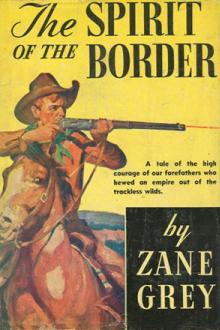The U. P. Trail, Zane Grey [robert munsch read aloud .txt] 📗

- Author: Zane Grey
Book online «The U. P. Trail, Zane Grey [robert munsch read aloud .txt] 📗». Author Zane Grey
Hough whispered in Neale’s ear: “Stanton throws the drunks out of here.”
No, it appeared the dancers were not drunk with liquor. But there was evidence of other drunkenness than that of the bottle. The floor was crowded. Looking at the mass, Neale could only see whirling, heated faces, white, clinging arms, forms swaying round and round, a wild rhythm without grace, a dance in which music played no real part, where men and women were lost. Neale had never seen a sight like that. He was stunned. There were no souls here. Only beasts of men, and women for whom there was no name. If death stalked in that camp, as Hough had intimated, and hell was there, then the two could not meet too soon.
If the mass and the spirit and the sense of the scene dismayed Neale, the living beings, the creatures, the women—for the men were beyond him—confounded him with pity, consternation, and stinging regret. He had loved two women—his mother and Allie—so well that he ought to love all women because they were of the same sex. Yet how impossible! Had these creatures any sex? Yet they were—at least many were—young, gay, pretty, wild, full of life. They had swift suppleness, smiles, flashing eyes, a look at once intent and yet vacant. But few onlookers would have noticed that. The eyes for which the dance was meant saw the mad whirl, the bare flesh, the brazen glances, the close embrace.
The music ended, the dancers stopped, the shuffling ceased. There were no seats unoccupied, so the dancers walked around or formed in groups.
“Well, I see Ruby has spotted you,” observed Hough.
Neale did not gather exactly what the gambler meant, yet he associated the remark with a girl dressed in red who had paused at the door with others and looked directly at Neale. At that moment some one engaged Hough’s attention.
The girl would have been striking in any company. Neale thought her neither beautiful nor pretty, but he kept on looking. Her arms were bare, her dress cut very low. Her face offered vivid contrast to the carmine on her lips. It was a round, soft face, with narrow eyes, dark, seductive, bold. She tilted her head to one side and suddenly smiled at Neale. It startled him. It was a smile with the shock of a bullet. It held Neale, so that when she crossed to him he could not move. He felt rather than saw Hough return to his side. The girl took hold of the lapels of Neale’s coat. She looked up. Her eyes were dark, with what seemed red shadows deep in them. She had white teeth. The carmined lips curled in a smile—a smile, impossible to believe, of youth and sweetness, that disclosed a dimple in her cheek. She was pretty. She was holding him, pulling him a little toward her.
“I like you!” she exclaimed.
The suddenness of the incident, the impossibility of what was happening, made Neale dumb. He felt her, saw her as he were in a dream. Her face possessed a peculiar fascination. The sleepy, seductive eyes; the provoking half-smile, teasing, alluring; the red lips, full and young through the carmine paint; all of her seemed to breathe a different kind of a power than he had ever before experienced—unspiritual, elemental, strong as some heady wine. She represented youth, health, beauty, terribly linked with evil wisdom, and a corrupt and irresistible power, possessing a base and mysterious affinity for man.
The breath and the charm and the pestilence of her passed over Neale like fire.
“Sweetheart, will you dance with me?” she asked, with her head tilted to one side and her half-open veiled eyes on his.
“No,” replied Neale. He put her from him, gently but coldly.
She showed slow surprise. “Why not? Can’t you dance? You don’t look like a gawk.”
“Yes, I can dance,” replied Neale.
“Then will you dance with me?” she retorted, and red spots showed through the white on her cheeks.
“I told you no,” replied Neale.
His reply transported her into a sudden fury. She swung her hand viciously. Hough caught it, saving Neale from a sounding slap in the face.
“Ruby, don’t lose your temper,” remonstrated the gambler.
“He insulted me!” she cried, passionately.
“He did not. Ruby, you’re spoiled—”
“Spoiled—hell!... Didn’t he look at me, flirt with me? That’s why I asked him to dance. Then he insulted me. I’ll make Cordy shoot him up for it.”
“No, you won’t,” replied Hough, and he pulled her toward his companion, a tall woman with golden hair. “Stanton, shut her up.”
The woman addressed spoke a few words in Ruby’s ear. Then the girl flounced away. But she spoke with withering scorn to Neale.
“What in hell did you come in here for, you big handsome stiff?”
With that she was lost amid her mirthful companions.
Hough turned to Neale. “The girl’s a favorite. You ruffled her vanity... you see. That’s Benton. If you had happened to be alone you would have had gunplay. Be careful after this.”
“But I didn’t flirt with her,” protested Neale. “I only looked at her—curiously, of course. And I said I wouldn’t dance.”
Hough laughed. “You’re young in Benton. Neale, let me introduce to you the lady who saved you from some inconvenience.... Miss Stanton—Mr. Neale.”
And that was how Neale met Beauty Stanton. It seemed she had done him a service. He thanked her. Neale’s manner with women was courteous and deferential. It showed strangely here by contrast. The Stanton woman was superb, not more than thirty years old, with a face that must have been lovely once and held the haunting ghost of beauty still. Her hair was dead gold; her eyes were large and blue, with dark circles under them; and her features had a clear-cut classic regularity.
“Where’s Ancliffe?” asked Hough, addressing Stanton. She pointed, and Hough left them.
“Neale, you’re new here,” affirmed the woman, rather curiously.
“Didn’t I look like it? I can’t forget what that girl said,” replied Neale.
“Tell me.”
“She asked me what in the hell I came here for. And she called me—”
“Oh, I heard what Ruby called you. It’s a wonder it wasn’t worse. She can swear like a trooper. The men are mad over Ruby. It’d be just like her to fall in love with you for snubbing her.”
“I hope she doesn’t,” replied Neale, constrainedly.
“May I ask—what did you come here for?”
“You mean here to your dance-hall? Why, Hough brought me. I met him. We played cards and—”
“No. I mean what brought you to Benton?”
“I just drifted here.... I’m looking for a—a





Comments (0)